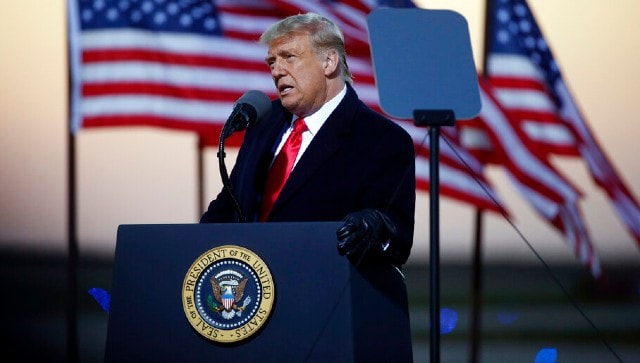US elections: Donald Trump has normalised selfishness, made it America’s national credo

When a once-in-a-century pandemic strikes, public health experts ask all to wear masks, but the US president tells Americans that mask-wearing is one of those rules not to be followed (like paying taxes, like the emoluments clause, like campaign finance laws, like obstructing justice)
Back in the early 2000s, an academic named Robert Sampson did one of the better-known studies in urban sociology of the past 20 years, discreetly dropping thousands of stamped and addressed letters all over the streets of Chicago. What he was looking for, essentially, was to see which neighborhoods would be most diligent about dropping those letters in mailboxes rather than allowing them to collect footprints on the sidewalk and turn to pulp.
What he discovered was intriguing. One of the best predictors of a letter’s fate had to do with how high a neighborhood measured in what Sampson called “moral cynicism,” or the notion that laws and informal rules weren’t really and truly binding. How he measured moral cynicism was straightforward: He asked thousands of Chicagoans to agree or disagree with a shortlist of statements.
Laws were made to be broken.
It’s OK to do anything you want as long as you don’t hurt anyone.
To make money, there are no right and wrong ways anymore, only easy ways and hard ways.
In hindsight, Sampson recently told me, one of the weirdest and most chilling things about staring at that list is to see how easily it could double as a declaration of President Donald Trump’s worldview. “You know, the idea that it’s all dog-eat-dog,” he said, “or that you’re a chump to care about others.”
Our president has basically spent four years telling an entire nation not to bother dropping lost letters in the mail.
It is cliché at this point to note that Trump has laid waste to our norms and customs, and in so doing, eroded our trust in institutions whose reputations were already in sharp decline (the media and federal government instantly come to mind), as well as our trust in our fellow Americans.
But what Sampson was describing was somehow different, and I think more profound. He was articulating the price of that lost trust: generosity. As a nation, we’ve lost our sense of altruistic and moral purpose, a collective will to do what is decent and right and, as sociologists like to say, “other-regarding.” Instead, we’ve been living in a state benumbed and a benumbed state, in which nihilism prevails and corruption oozes from the very top.
Another way to think about this might be to say that we’ve been living in a noir film. Or that we’re enacting the zero-sum values of reality television. What is it that contestants are so fond of saying? I’m not here to make friends; I’m here to win.
But the point is: Trump has normalised selfishness.
This moral cynicism has not been healthy, and I don’t just mean this in the psychological or spiritual sense. Our lost generosity has cost American lives. A once-in-a-century pandemic strikes, our public health experts eventually tell us all to wear masks for the commonweal, but the president tells us that mask-wearing is one of those rules not to be followed (like paying taxes, like the emoluments clause, like campaign finance laws, like obstructing justice). And so we, an extravagantly wealthy nation, suffer from an extravagant number of deaths.
An altruistic culture, in other words, could have been “its own form of nonpharmacological intervention” in the fight against COVID-19, says Nicholas Christakis, a doctor, and sociologist and the author of Apollo’s Arrow, a delightfully readable new book about the culture and the coronavirus.
What makes this crisis of generosity all the stranger is that moral cynicism — also sometimes referred to as “legal cynicism” — is generally associated with high levels of poverty and racial isolation, according to Sampson’s work. Yet Trump’s life has been marked by neither. It has in fact been marked by the very opposite: overabundance.
Then again, you could argue, as Kurt Andersen recently did in Evil Geniuses, that a certain breed of wealthy American now also thinks that the rules do not apply to it, and that this gang has been enshrining greed-is-good into custom and statute for the past 50 years.
How this particular horseshoe got forged — where the poorest people of colour and the most affluent white Americans both came to believe the same thing — could fill its own book. For now, though, it suffices to say that there’s a significant difference between what underlies their moral cynicism. The residents of Sampson’s cynical neighborhoods had understandable reasons to be mistrustful of certain laws and institutions. (Police brutality, lopsided prison sentencing and eviction disparities instantly spring to mind.) The Trumps of the world do not. They are loosening the yoke around their own necks while tightening it around others’.
There is, actually, an argument to be made that the rich were profiting shamelessly from deregulation and small-government reforms at around the same time the epidemic of mass incarceration began.
I came of age under presidents who spoke of our differences as bridgeable, resolvable things. Bill Clinton told us that “there is nothing wrong with America that cannot be cured by what is right with America”. George W Bush defined himself as a “compassionate conservative” and “a uniter, not a divider”. Barack Obama made his national debut with a keynote address that declared, “We worship an awesome God in the blue states” and “we’ve got some gay friends in the red states”.
These lines may always have been fiction or at least a partial fiction. During their presidencies, jails filled, factories shut, and the nation spun off a breakaway republic of the 1 percent. Maybe it was only a matter of time before a president like Trump came along who took such a Hobbesian view of humanity. Moral cynicism “taps the darker side of human nature,” as Sampson wrote in Great American City, his book about the importance of community culture in defining neighborhoods.
But the tension between preserving individual prerogatives and the common good is as old as America itself. Our sense of moral purpose, while fragile, has generally proved recoverable enough for us to make progress.
What’s so agonising now is that we’re all waiting to see whether it is again. Joe Biden has staked his entire campaign on his decency, his moral vision, his old-fashioned belief that one should love thy neighbor as thyself. A Trump campaign adviser may have sneeringly compared the former vice president to Mister Rogers during the candidates’ dueling town halls a couple of weeks ago. But it is Fred Rogers’ words that are repeatedly — at this point tiresomely, almost embarrassingly — invoked during times of national crisis. “Look for the helpers,” he urged children to do when they’re frightened. “You will always find people who are helping.”
If Trump and his allies disdain the idea of a man who believes in the human capacity to help, it says all you need to know about them. And if we, as a nation, choose a man who’s reminiscent of a beloved minister to be our next president, it’ll say something desperately needed — and at long last reassuring — about us.
Jennifer Senior c.2020 The New York Times Company
Find latest and upcoming tech gadgets online on Tech2 Gadgets. Get technology news, gadgets reviews & ratings. Popular gadgets including laptop, tablet and mobile specifications, features, prices, comparison.
#elections #Donald #Trump #normalised #selfishness #Americas #national #credo































